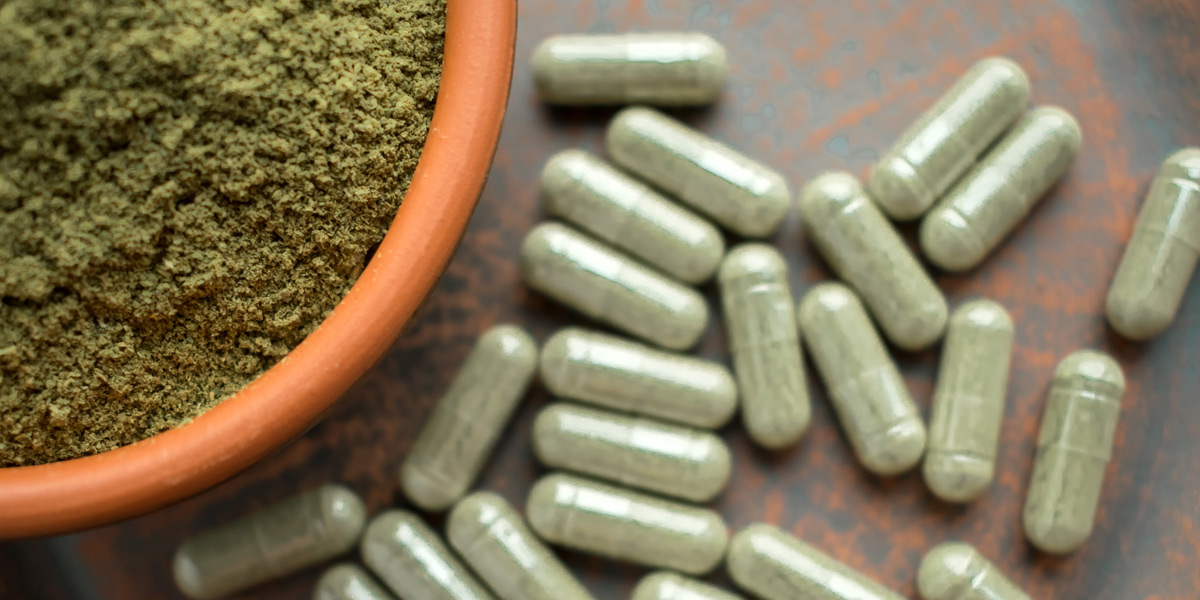What Prescription Drugs Interact with Kratom?

Commonly marketed as a legal and natural supplement, kratom comes from a tree native to Southeast Asia. The kratom leaves are dried, ground, and distributed as pills, capsules, powders, and sometimes extracts.
Kratom products may be plant-based, but that does not mean they are safe. There are many risks associated with kratom. Prescription drugs, especially opioid-based ones such as hydrocodone, morphine, oxycodone, and fentanyl, have been well documented to have harmful drug interactions with kratom.
One known death has resulted from kratom interacting with quetiapine pills, a type of antipsychotic medication.
What Does Kratom Do?
The effects of kratom products vary based on how much a person takes. Because kratom contains both mitragynine and 7-hydroxymitragynine, it mimics opioids when a person takes high doses. It interacts with opioid receptors and can reduce pain, provide sedation, and give the user feelings of pleasure.
Mitragynine interacts with different receptors in the brain, so smaller doses of kratom can cause effects similar to stimulants. Some people experience increased energy, heightened alertness, and sociability.

Is Kratom Legal?
While kratom products are not currently classified as illicit drugs, the Food and Drug Administration (FDA) strongly urges people not to use them and continues to track all available information. Kratom products marketed as dietary supplements are also dangerous and can have adverse effects.
Most importantly, the Drug Enforcement Agency (DEA) lists kratom as a drug and chemical of concern. Some states do have regulations around the drug, but currently, there is no nationwide consensus on how to classify and regulate it.
However, kratom is illegal in the following states:
- Alabama
- Arkansas
- Indiana
- Rhode Island
- Vermont
- Wisconsin
Negative Drug Interactions
In the United States, the government does not regulate over-the-counter dietary supplements and natural products. That means that even if someone thinks they are buying pure kratom, there is a chance there are other dietary ingredients that can pose a danger. Purchasing products on the internet is not safe either because there is a chance they will be “cut” or mixed with an unlisted ingredient.
Most deadly risks associated with kratom come from how the drug interacts with other substances, especially opioids. Prescription drugs can result in a dangerous drug interaction when taken with kratom. Its use combined with regularly using acetaminophen can damage the liver. People with opioid use disorder who also take it regularly are especially at risk.

FDA Warning on Kratom
According to a statement from FDA Commissioner Scott Gottlieb MD on FDA advisory about deadly risks associated with kratom, there is an ongoing effort in health care to find ways of treating opioid addiction and opioid withdrawal symptoms and cravings. There is no scientific evidence that it is safe for use in this manner.
Currently, the FDA has received no research or case studies showing any medicinal or beneficial effects of kratom. Additionally, the agency emphasizes that it has a high potential for abuse, dangerous drug interactions, and side effects.
As of 2018, there were 44 deaths linked with kratom use, including one person who had no history of opioid use and no other medication in their system. There are most likely more unreported deaths involving kratom; many people don’t disclose its usage to doctors or emergency responders, especially if they took other, “harder” drugs at the same time.
There is a misconception that kratom is not dangerous because it comes from a plant; that is not true, as many fatal and addictive drugs originate from natural sources, including heroin and cocaine.
The FDA confirmed 199 cases in a multistate outbreak of salmonella infections linked to kratom exposure and consumption. Further case reports and investigations revealed an incredibly high rate of salmonella in kratom products. Further investigation revealed that the contaminated products came from different manufacturers. The FDA concluded the plant itself, not the site of processing, was responsible for the outbreak.
The FDA constantly updates import alerts regarding kratom and has seized several large shipments.
Kratom Effects
As kratom use increases in America, so have reports of complications from its exposure. On its own, mixed with prescription drugs or other drugs, it can still have negative effects. Low doses have shorter and more mild effects, but higher doses can be more severe and have long-term impacts on consumers.
A lot of people experience mental health problems with the chronic use of kratom. Below are some of the more common health issues it can cause. Seek professional health care if you are experiencing problems after taking kratom. There has been one successful case of Narcan used to reverse a kratom overdose when no other drugs were present.
Side Effects
The side effects of kratom include:
- Nausea
- Itching
- Increased thirst
- Dry mouth
- Loss of appetite
- Sweating
- Drowiness
- Constipation
- Muscle soreness and spasms
- Runny nose
Adverse Effects
The adverse effects of kratom involve:
- Seizures
- Hostility and aggression
- Insomnia
- Weight loss
- Tremors
- Hallucinations
- Anorexia
- Liver disease

Kratom Withdrawal
Because kratom functions like an opioid, the withdrawal and craving symptoms are very similar to opioid withdrawal and can be life-threatening.
Kratom withdrawal can present as:
- Twitching
- Itching
- Confusion
- Irritability
- Loss of appetite
- Fluctuating body temperature, going from hot to cold
- Diarrhea
- Muscle soreness
- Runny eyes and nose
- Mood swings
- Hallucinations
- Seizures
- Slow or difficulty breathing
- Cardiac arrest
- Death
Kratom Addiction
Much like any other drug, tolerance can increase with repeated use of kratom. Over time, a user will need to take higher doses to feel the effects more often. Taking it more frequently can lead to dependence and addiction.
People attempting to treat their opioid addictions themselves sometimes use kratom, resulting in the remaining addiction, just to a different substance. It is important to remember that it has the same chemical effects on the brain as opioids and is not a viable or proven treatment, especially in people with a history of drug abuse.
Most people dependent on kratom are poly-users, meaning they use several different drugs, resulting in more than one type of addiction. The most common co-addiction is a dependence on opioids, in which case a doctor may recommend medically detoxing.
How to Get Help
Substance abuse treatment for kratom addiction is an evolving science, and each person has unique needs. Northridge Addiction Treatment Center develops comprehensive and collaborative, personalized treatment plans that give you the skills to live a life free from addiction.
Our residential treatment facility is fully licensed and accredited and staffed with credentialed experts that prioritize the comfort and success of our residents.
Located in San Fernando Valley, surrounded by beautiful scenery, we offer a calm environment, free of outside distractions, so healing is the top priority.
If you or a loved one is struggling with drug and alcohol dependence, help is available. We know it can seem overwhelming, but our admissions specialists are happy to answer any questions you may have.
Reach out today to take the first steps on your path to recovery. We are only a phone call away.
Find Meaningful Recovery
Our caring and compassionate specialists are eager to help you comfortably navigate this journey to recovery. Our individualized treatment plan, programs, and therapies may be a perfect match for you or your loved one. Let us assist you in living the happy life you deserve. It starts with a phone call.




